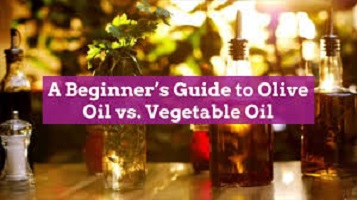Is Vegetable Oil The Same As Olive Oil?
Is Vegetable Oil The Same As Olive Oil?

Olive oil and vegetable oil are both commonly used in cooking.
While olive oil is sourced from olives and is typically less processed, vegetable oil is typically a combination of numerous plant oils that have been thoroughly processed into a bland-tasting product.
What is olive oil?
Fresh entire olives are used to extract olive oil until the natural oils are generated. The olives are pressed in a machine that can be operated manually or automatically.
This sort of oil is utilized for more than just cooking; it can also be used as lamp fuel, a cosmetic ingredient, or a pharmaceutical substance.
It also has a significant function in religious rites and ceremonies. Spain is the world’s leading producer of olive oils, followed by Italy and France.
Olive cultivars of many sorts are used to make these. It comes in a variety of flavors, textures, and shelf lives to suit a variety of applications.
Depending on the maturity of the fruit, the color can range from green to violet to black.
The Mediterranean region is home to the most olive trees. Since the eighth millennium BC, these have been in use.
What is Vegetable Oil, and how does it differ from other oils?
Oils from common seeds including soybean, rapeseed, and cocoa butter are extracted via Vegetable Oil.
It’s mainly derived from palm and rice bran oil for the fruits.
Corn, sesame, and hazelnut oil, as well as peanut, sunflower, and grape seed oil, are other popular vegetable oil sources around the world.
Other countries’ vegetable oils may differ depending on the geographical location and availability of oil sources.
Triglycerides, the same component found in animal fats, make up these vegetable fats.
It can be used for industrial applications and as a fuel substitute, such as biofuels, in addition to cooking.
Israel and Palestine have been using it since 4500 BCE.
Is Vegetable Oil a Good Substitute for Olive Oil?
Yes, you certainly can! Though there will be a significant change in flavor, the advantages are far superior and healthier.
Why not use vegetable oil instead of olive oil?
Monounsaturated fat makes up the majority of olive oil’s fat content.
This type of fat is crucial to your health, according to research by the American Heart Association (AHA).
Always choose Extra Virgin Olive Oil, which is prepared without the use of heat or solvents.
The nutrients in the oil are still intact because the treatment did not alter its quality or original form.
It’s crucial to remember that everything should be done in proportion.
Olive oil is still called “fat,” and consuming too much of it might cause health problems.
Suggestions
Whether you’re trying to lose weight or simply want to eat healthier, we’ve got you covered.
Here are some helpful hints and a simple approach to using olive oil:
Cooking your meals in a different way is a good idea.
Sauteing the meal simply enhances the flavor and aroma of the food.
We usually start with a hot pan of ordinary cooking oil, add some garlic and onions, and then the primary item.
We had no idea that a spoonful of oil could contain so many calories.
To get rid of undesirable transfat and unnecessary calories in your cuisine, switch to olive oils. When you eat it, it will seem less greasy and guilt-free.
Vegetable oils can be extracted from a wide range of plants, including pumpkins, grape seeds, and sunflowers.
However, unlike olive oil, which is made entirely of olives, vegetable oil is made out of a variety of oils such as canola, corn, soybean, palm, or sunflower.
What do olive oil and vegetable oil have in common?
Because olives are technically a fruit and not a vegetable, comparing these two oils is a bit of an apples-to-oranges (or fruits-to-veggies) exercise.
Olive and vegetable oils, on the other hand, share certain similarities.
For one thing, their smoke points are comparable (the temperatures at which oils begin to degrade, emitting harmful free radicals).
The smoke point of extra-virgin olive oil is around 390°F, while that of vegetable oil is somewhat higher at 400°F.
This means you may use them in similar ways in the kitchen, such as pan-searing and sautéing.
(Use light olive oil for higher-temperature cooking.) It can withstand temperatures of up to 470°F.)
Both olive and vegetable oils have a wide range of uses in baking. You can use them interchangeably or even combine them in many muffins, cake, and quick bread recipes.
If you choose olive oil, be prepared for a stronger flavor.
Olive oil is suitable for desserts with a strong flavor, such as olive oil cake, but vegetable oil’s neutral flavor makes it ideal for adding fat to baked products without changing the flavor.
In a pinch, however, olive oil will suffice in baked products.
Can I bake with vegetable oil instead of olive oil?
You can use a 1 to 1 ratio of olive oil to vegetable oil (or any cooking oil) in baking recipes.
Because of its particular flavor, olive oil may alter the flavor of baked goods.
What happens if vegetable oil is substituted for olive oil?
It’s not a problem if you use vegetable oil instead of olive oil.
You won’t get the same flavor as olive oil, but in the case of more refined (not extra virgin) olive oils, it won’t make much of a difference.
Simply use the amount of oil specified in the recipe. Everything will be OK.
When you use olive oil instead of vegetable oil, your brownies will have a fruity, slightly bitter flavor that pairs well with chocolate.
If you’re looking for an olive oil substitute, go for one with a milder flavor so it doesn’t overpower.
Is it possible to use olive oil instead of vegetable oil in brownies?
Yes, to address the primary question. When baking brownies, you can substitute olive oil for vegetable oil.
Replace the vegetable oil with the same amount of olive oil that the recipe calls for. Both oils should measure the same because they have the same density.
In brownies, what can I use instead of vegetable oil?
In baked goods, the following can be used in place of vegetable oil, cup for the cup:
- Applesauce, preferably unsweetened.
- Banana, ripe and mashed.
- Butter, melted
- Cauliflower – unseasoned, cooked, and pureed.
- Ghee.
- Margarine melted.
- Mayonnaise.
- Pumpkin cooked and pureed.
In general, we don’t recommend substituting olive oil for vegetable oil in baking recipes.
Olive oil is suitable for desserts with a strong flavor, such as olive oil cake, but vegetable oil’s neutral flavor makes it ideal for adding fat to baked products without changing the flavor.
When baking, can I use olive oil instead of vegetable oil?
We discovered that olive oil can be used in place of other oils in a one-to-one ratio.
Use the same amount of extra virgin olive oil in a recipe that asks for half a cup of vegetable oil, for example.
Carrot cake, pound cake, and chocolate cake have all been used in this way.
Is olive oil the same as vegetable oil when it comes to baking cakes?
Using Olive Oil to Bake
You can use a 1 to 1 ratio when substituting olive oil for vegetable oil (or any cooking oil) in baking recipes.
Because of the particular flavor of olive oil, it may impact the flavor of baked goods.
We’ve got some delectable cake recipes that include olive oil.
What is the healthiest cooking oil?
Cooking Oil Essentials: The 5 Healthiest Oils
- Extra Virgin Olive Oil There’s a reason why olive oil is so popular.
- Avocado Oil is a healthy fat that comes from avocados.
Avocado oil has many of the same advantages as extra virgin olive oil, but it has a higher smoking point, making it ideal for sautéing and pan-frying.
- Coconut Oil
- Sunflower Oil
Is olive oil the healthiest oil on the market?
Olive oil is a type of oil that comes from the olive
Olive oil, as long as it’s extra virgin, is one of the most versatile and healthful oils to cook with and eat, according to nutrition and cookery experts.
“You want an oil that isn’t refined or highly processed,” says the expert.
It’s not a problem if you use vegetable oil instead of olive oil.
You won’t get the same flavor as olive oil, but in the case of more refined (not extra virgin) olive oils, it won’t make much of a difference.
Simply use the amount of oil specified in the recipe. Everything will be OK.
Is it possible to substitute vegetable oil for olive oil in a recipe?
You can use a 1 to 1 ratio when substituting olive oil for vegetable oil (or any cooking oil) in baking recipes.
Because of its particular flavor, olive oil may alter the flavor of baked goods.
Which oil has the fewest calories?
If you’re on a weight-loss regimen, you’ll want to choose a cooking oil with the least amount of saturated fat.
The ideal oils to use are coconut and canola.
Is vegetable oil in any way inferior to olive oil?
When compared to vegetable oil, olive oil offers more health benefits and is more natural oil.
Because olive oil has lower fat content than vegetable oil, it has a lower smoke point.
The smoke point of extra-virgin olive oil is around 390°F, while that of vegetable oil is somewhat higher at 400°F.
This means you may use them in similar ways in the kitchen, such as pan-searing and sautéing.
(Use light olive oil for higher-temperature cooking.)
Is the smoke point of vegetable oil high?
Unless you’re using a neutral fat with a high smoke point, you’ll want to remove it from the heat.
Olive oil or vegetable oil: Which smokes less
Instead, you’ll be able to see or smell the smoke.
So extra-virgin olive oil, which is aromatic and tasty, has a lower smoke point than processed vegetable oils like corn, canola, and sunflower oils, which are odorless and flavorless.
Is olive oil with a high smoke point?
Extra virgin olive oils of excellent grade (poor in free fatty acids) have a high smoke point.
They are a great option, but they are pricey. The smoke point of mass-produced, low-quality olive oils is significantly lower.
Smoke Points of Olive and Vegetable Oils
Due to its higher smoke point, vegetable oil is commonly used in fried chicken, French fries, and other fried meals.
This means it can withstand extreme heat without smoking or breaking down.
The smoke point of vegetable oil is around 460oF, while olive oil is around 410oF.
Do you use olive oil or vegetable oil to cook chicken?
Searing is best done over medium-high heat, and the correct oil, such as vegetable or olive, is essential.
Before adding the chicken, make sure the skillet is hot.
Heat 1 tablespoon olive oil in your skillet (you may also use vegetable oil or cooking spray) over medium-high heat.
Do you cook your chicken with olive oil?
Small bits or anything that will cook rapidly is best fried in Extra Virgin Olive Oil.
Fried chicken tenders or thin chicken breasts, rather than complete bone-in chicken breasts, are a great example.
Less is more in this case. For shallow or pan-frying, Extra Virgin Olive Oil is ideal.
Can I cook chicken with veggie oil?
Consider vegetable, canola, or peanut oil. Olive oil and butter have lower smoke points and should not be used.
The best temperature for frying chicken is 350 to 365 degrees Fahrenheit, and you’ll want to keep the oil warm between batches.
When it comes to baking, is vegetable oil the same as olive oil?
Olive oil is suitable for desserts with a strong flavor, such as olive oil cake, but vegetable oil’s neutral flavor makes it ideal for adding fat to baked products without changing the flavor.
In a pinch, however, olive oil will suffice in baked products.


